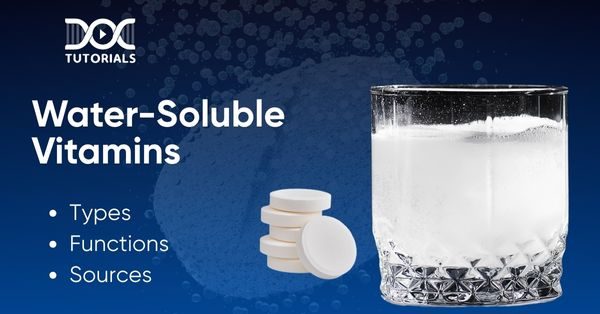Water-Soluble Vitamins: Types, Functions, and Sources

Vitamins are crucial for overall health, but not all vitamins work similarly in the body. Water-soluble vitamins (like vitamin C and B vitamins) dissolve in water and are not stored in large amounts, so they need to be replenished regularly through diet. They play a major role in energy production, brain function, and immune support.
Knowing water-soluble vitamins is essential for medical aspirants as they impact everything from metabolism to disease prevention. This guide will break them down for you to understand their functions, sources, and importance in health.
What are Water-Soluble Vitamins?
Water-soluble vitamins are a group of essential organic compounds that dissolve in water and are absorbed into the bloodstream during digestion. Unlike fat-soluble vitamins, water-soluble vitamins are not stored in large amounts and need to be taken regularly through diet.
The two main categories of water-soluble vitamins are Vitamin C and the B-complex vitamins, which consist of 8 different compounds. Each B vitamin has a specific role to play in overall health:
- Thiamine (B1) – Energy production and nerve function.
- Riboflavin (B2) – Growth, cell function and metabolism.
- Niacin (B3) – Energy release and skin health.
- Pantothenic Acid (B5) – Synthesising coenzymes and hormones.
- Pyridoxine (B6) – Brain development and neurotransmitter function.
- Biotin (B7) – Healthy hair, skin and metabolism.
- Folate (B9) – DNA (deoxyribonucleic acid) formation and foetal development.
- Cobalamin (B12) – Nerve health and red blood cell production.
Water-soluble vitamins are essential for energy production, brain function, immune support, and overall well-being. Since the body does not store them extensively, regular dietary intake is necessary to avoid deficiencies.
Essential Characteristics of Water-Soluble Vitamins
Water-soluble vitamins have certain characteristics that distinguish them from fat-soluble vitamins. Their water solubility ensures good absorption, transport, and utilisation in the body. However, limited storage and vulnerability to external factors make regular intake crucial.
Solubility and Absorption
Water-soluble vitamins dissolve in water and can easily be transported through the bloodstream. They are absorbed mainly in the small intestine without the need for dietary fat like fat-soluble vitamins. This makes them more available to the body and allows them to be distributed quickly to tissues and organs.
Limited Storage and Excretion
Fat-soluble vitamins are stored in the liver and fatty tissues, while water-soluble vitamins are not stored in large amounts. Any excess is excreted through urine, reducing the risk of toxicity but also increasing the need for regular dietary intake to maintain optimal levels.
Susceptibility to Processing
Water-soluble vitamins are more fragile than fat-soluble ones and can break down when exposed to heat, light, or prolonged storage. For example, Vitamin C is sensitive to heat and can be lost during food processing. Thus, it is important to consume fresh food to maintain its levels.
Vital Functions in the Body
Water-soluble vitamins support many physiological processes. Vitamin C is involved in immune function and collagen synthesis, while B-complex vitamins are involved in energy metabolism, nerve function, and red blood cell formation.
Types of Water-Soluble Vitamins
The types of water-soluble vitamins include Vitamin C and the Vitamin B complex group, each playing a different role in health.
Vitamin C (Ascorbic Acid)
An antioxidant, Vitamin C, protects cells from oxidative stress and helps with collagen synthesis, wound healing, and immune function. It enhances iron absorption from plant-based foods and supports heart health and skin health. Regular intake helps the body fight off infections and overall well being.
| Food Source | Per Serving | Mgs per serving |
| Red pepper | 1/2 cup | 95 |
| Orange juice | 3/4 cup | 93 |
| Orange | 1 medium orange | 70 |
| Grapefruit juice | 3/4 cup | 70 |
| Kiwi | 1 medium kiwi | 64 |
| Green pepper | 1/2 cup | 60 |
| Broccoli (cooked) | 1/2 cup | 60 |
| Strawberries | 1/2 cup | 48 |
| Brussels sprouts | 1/2 cup | 48 |
| Grapefruit | 1/2 medium grapefruit | 39 |
Vitamin B1 (Thiamine)
Thiamine is important for energy metabolism and helps convert carbohydrates into energy. It also supports nerve function and is key to heart and brain health. Deficiency can cause beriberi and Wernicke-Korsakoff syndrome, affecting neurological and muscular function.
| Food Source | Per Serving | Mgs per serving |
| Thiamin-fortified cereal | 1 serving (per serving size on label) | 1.2 |
| Enriched egg noodles | 1 cup | 0.5 |
| Pork chops | 3 ounces | 0.4 |
| Cooked trout | 3 ounces | 0.4 |
| Black beans | 1/2 cup | 0.4 |
| Enriched English muffin | 1 muffin | 0.3 |
| Cooked bluefin tuna | 3 ounces | 0.2 |
| Whole-wheat macaroni | 1 cup | 0.2 |
| Acorn squash | 1/2 cup | 0.2 |
| Long-grain brown rice | 1/2 cup | 0.2 |
Vitamin B2 (Riboflavin)
Essential for energy production, Riboflavin helps metabolise fats, proteins, and carbohydrates. It also acts as an antioxidant, protecting cells from oxidative damage. Deficiency can cause angular cheilitis (cracks in the corners of the mouth) and ariboflavinosis, leading to skin and eye problems.
| Food Source | Per Serving | Mgs per serving |
| Beef liver | 3 ounces | 2.9 |
| Fortified breakfast cereals | 1 serving (per serving size on label) | 1.3 |
| Fortified oats | 1 cup | 1.1 |
| Yoghurt | 1 cup | 0.6 |
| 2% milk | 1 cup | 0.5 |
| Tenderloin steak | 3 ounces | 0.4 |
| Clams | 3 ounces | 0.4 |
| Dry-roasted almonds | 1 ounce | 0.3 |
| Swiss cheese | 3 ounces | 0.4 |
Vitamin B3 (Niacin)
Niacin supports energy metabolism, DNA repair, and hormone synthesis. It is also important for skin and nerve health and helps regulate cholesterol. Severe deficiency can cause pellagra, which is characterised by dermatitis, diarrhoea, and dementia.
| Food Source | Per Serving | Mgs per serving |
| Beef liver | 3 ounces | 14.9 |
| Chicken breast | 3 ounces | 10.3 |
| Spaghetti sauce | 1 cup | 10.3 |
| Turkey breast | 3 ounces | 10 |
| Sockeye salmon | 3 ounces | 8.6 |
| Light tuna (canned) | 3 ounces | 8.6 |
| Pork tenderloin | 3 ounces | 6.3 |
| Ground beef | 3 ounces | 5.8 |
| Brown rice | 1 cup | 5.2 |
| Dry-roasted peanuts | 1 ounce | 4.2 |
Vitamin B5 (Pantothenic Acid)
Pantothenic Acid, a component of coenzyme A (CoA), is important for energy metabolism and the production of fatty acids, cholesterol, and steroid hormones. It also supports adrenal function and skin health. Deficiency is rare but can cause fatigue, irritability, and numbness in the hands and feet.
| Food Source | Per Serving | Mgs per serving |
| Beef liver | 3 ounces | 8.3 |
| Fortified breakfast cereal | 1 serving (per serving size on label) | 5 |
| Shitake mushrooms | 1/2 cup | 2.6 |
| Sunflower seeds | 1/4 cup | 2.4 |
| Chicken breast | 3 ounces | 1.3 |
| Fresh bluefin tuna | 3 ounces | 1.2 |
| Avocado | 1/2 avocado | 1 |
Vitamin B6 (Pyridoxine)
Pyridoxine is involved in over 100 enzymatic reactions. It is important for amino acid metabolism, neurotransmitter production, and red blood cell formation. It also supports immune function and hormone balance. Deficiency can cause anaemia, dermatitis, and neurological problems like mood swings and cognitive problems.
| Food Source | Per Serving | Mgs per serving |
| Chickpeas | 1 cup | 1.1 |
| Beef liver | 3 ounces | 0.9 |
| Fresh yellowfin tuna | 3 ounces | 0.9 |
| Sockeye salmon | 3 ounces | 0.6 |
| Chicken breast | 3 ounces | 0.5 |
| Fortified breakfast cereal | 1 serving (per serving size on label) | 0.4 |
| Potatoes | 1 cup | 0.4 |
| Turkey | 3 ounces | 0.4 |
| Banana | 1 medium banana | 0.4 |
| Spaghetti sauce | 1 cup | 0.4 |
Vitamin B7 (Biotin)
Biotin is involved in the metabolism of carbohydrates, fats, and proteins. It also helps with healthy hair, skin, and nails, making it a popular ingredient in beauty supplements. Deficiency is rare but can cause hair loss, skin rashes, and neurological symptoms.
| Food Source | Per Serving | Mgs per serving |
| Beef liver | 3 ounces | 30.8 |
| Eggs | 1 egg | 10 |
| Canned salmon | 3 ounces | 5 |
| Pork chops | 3 ounces | 3.8 |
| Hamburger patty | 3 ounces | 3.8 |
| Sunflower seeds | 1/4 cup | 2.6 |
| Sweet potato | 1/2 cup | 2.4 |
| Roasted almonds | 1/4 cup | 1.5 |
| Canned tuna | 3 ounces | 0.6 |
| Spinach | 1/2 cup | 0.5 |
Vitamin B9 (Folate/Folic Acid)
Important for DNA synthesis and cell division, Folate is especially important during pregnancy to prevent neural tube defects in the foetus. It also supports red blood cell production, heart health, and cognitive function. Deficiency can cause megaloblastic anaemia and developmental problems in unborn babies.
| Food Source | Per Serving | Mgs per serving |
| Beef liver | 3 ounces | 215 |
| Peanuts | 1/2 cup | 175 |
| Black-eyed peas | 1/2 cup | 105 |
| Fortified breakfast cereals | 1 serving size (per serving size on label) | 100 |
| White rice | 1/2 cup | 90 |
| Asparagus | 4 spears | 89 |
| Enriched pasta | 1/2 cup | 74 |
| Kidney beans | 1/2 cup | 65 |
| Romaine lettuce | 1 cup | 64 |
| Avocado | 1/2 cup | 59 |
| Spinach | 1 cup | 58 |
Vitamin B12 (Cobalamin)
Cobalamin is important for DNA synthesis, red blood cell formation, and nerve function. It works with Folate to regulate homocysteine levels, which affect heart health. Deficiency can cause pernicious anaemia, cognitive decline, and nerve damage. Since it is primarily found in animal-based foods, vegetarians and vegans may need supplements.
| Food Source | Per Serving | Mgs per serving |
| Beef liver | 3 ounces | 70.7 |
| Clams | 3 ounces | 17 |
| Fortified nutritional yeast | 1 serving (per serving size on label) | 8.3 to 24 (depending on brand) |
| Atlantic Salmon | 3 ounces | 2.6 |
| Light canned tuna | 3 ounces | 2.5 |
| Ground beef | 3 ounces | 2.4 |
| 2% milk | 1 cup | 1.3 |
| Yoghurt | 6 ounces | 1 |
| Fortified breakfast cereal | 1 serving (per serving size on label) | 0.6 |
| Cheddar cheese | 1 1/2 ounces | 0.5 |
| Eggs | 1 large egg | 0.5 |
These water-soluble vitamins are vital for numerous body functions, making a balanced diet essential to prevent deficiencies and maintain good health.
How do Water-Soluble Vitamins support the Body?
These vitamins are involved in every metabolic process, from energy production to immune defence. Since they are not stored in large amounts, regular intake is necessary to prevent deficiencies and maintain optimal body function.
Energy Production and Metabolism
B-complex vitamins (thiamine (B1), riboflavin (B2), niacin (B3), pantothenic acid (B5), biotin (B7)) break down carbohydrates, proteins, and fats into usable energy.
They are cofactors in enzyme reactions that produce ATP (Adenosine triphosphate), the body’s main energy source. Deficiency in these vitamins can cause fatigue, weakness, and impaired metabolism.
Antioxidant Protection
Vitamin C is an antioxidant that neutralises free radicals, reducing cell stress. This reduces the risk of chronic diseases, heart disease, cancer, and neurodegenerative disorders.
Vitamin C also regenerates other antioxidants like Vitamin E, further boosting the body’s defence against cellular damage.
Collagen Synthesis and Tissue Repair
Collagen (skin elasticity, wound healing, connective tissue strength) requires Vitamin C for proper formation. Without enough Vitamin C, collagen production slows down, affecting skin health, blood vessel integrity, and tissue repair. Thus, the vitamin is essential for healthy skin, joints and overall structural support.
Immune System Support
Water-soluble vitamins (Vitamin C and B Vitamins like B6, B9, and B12) are important for immune defence. Vitamin C boosts white blood cells (neutrophils, macrophages, and lymphocytes) that fight infections. B vitamins produce antibodies and cytokines for a strong and balanced immune response.
Neurotransmitter and Brain Function
B-complex vitamins are involved in neurotransmitter production, which regulates mood, cognition, and nerve signalling. For example, Vitamin B6 is needed to synthesise serotonin and dopamine, which both affect mood stability, sleep, and stress management.
Deficiency in these vitamins can cause mental fatigue, mood swings, and cognitive issues.
Red Blood Cell Formation
Folate (B9) and B12 are involved in red blood cell production in the bone marrow. They are for DNA synthesis and cell division to form healthy red blood cells. Deficiency in these vitamins can cause megaloblastic anaemia with symptoms of weakness, dizziness, and pale skin.
Water-soluble vitamins are essential for various bodily functions. They can be obtained through diet or supplements to prevent deficiencies and promote overall wellness.
FAQs about Water-Soluble Vitamins
1. What are the sources and functions of water-soluble vitamins?
Water-soluble vitamins play a key role in energy production, metabolism, and tissue formation. They help form coenzymes that assist in breaking down proteins, fats, and carbohydrates for energy storage or tissue repair. Pantothenic acid, for example, requires the tricarboxylic acid cycle for coenzyme formation.
2. Which water-soluble vitamins are essential?
The most important water-soluble vitamins include:
- Vitamin C
- B-complex vitamins, including:
- B1 (Thiamin)
- B2 (Riboflavin)
- B3 (Niacin)
3. How can deficiencies of water-soluble vitamins be treated?
Deficiencies can often be corrected through a proper diet. Consuming vitamin-rich foods like whole grains, meat, poultry, eggs, fish, dairy, and vegetables helps restore vitamin levels. Both Vitamin B and Vitamin C are essential to prevent deficiency-related disorders.
4. What deficiency disorders are caused by a lack of water-soluble vitamins?
A deficiency in water-soluble vitamins can lead to various health issues:
- Vitamin C Deficiency – causes scurvy, bleeding gums, tooth loss, and slow wound healing.
- Vitamin B Deficiencies – Can result in neurological, cardiovascular, and metabolic disorders:
- B1 Deficiency (Thiamin): This leads to ATP depletion, which affects the brain, nerves, and heart.
5. What do vitamins do for the body?
Vitamins are essential for overall health. They support bone growth, vision, wound healing, and immune function. They also help convert food into energy and repair cellular damage. Vitamins are classified into two types: water-soluble (B-complex and Vitamin C) and fat-soluble (Vitamins A, D, E, and K).
Conclusion
Water-soluble vitamins (8 B vitamins and Vitamin C) are involved in energy metabolism, immune support, collagen synthesis, and red blood cell production. Meeting daily vitamin requirements will improve overall well-being, immunity, and long-term health. To learn more about such medical topics, check out DocTutorials’ study materials designed for NEET PG aspirants. Excel in NEET PG with our comprehensive study materials and expert guidance.
Latest Blogs
-

NEET PG Exam 2025- Date, Pattern, Marking Scheme, Subject Wise Weightage, and Exam Mode
NEET PG Exam 2025 is the ultimate gateway for medical graduates aspiring to pursue postgraduate courses in medicine, including MD,…
-

INI CET Exam 2025: Your Roadmap to Success – Key Topics, Strategies, and Lessons from Last Year’s Papers
The INI CET exam is more than just a test; it’s a significant milestone for many medical students aiming to…
-

INI CET Exam Success: Previous Year Question Papers & Ultimate Guide – INI CET PYQ
One can feel overwhelmed while preparing for the INI CET (Institute of National Importance Combined Entrance Test). A vast syllabus,…




